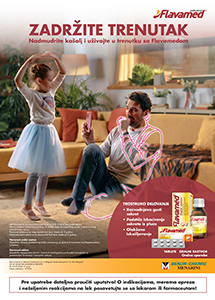EDITOR'S WORD
Keywords:
editorialAbstract
Dear readers, authors, colleagues, students, collaborators and all members of the friendly group of preventive pediatrics,
It is my pleasure to invite you to browse the latest issue of the Journal of Preventive Pediatrics, find interesting articles and newspapers, or just confirm your previous knowledge. After a full 10 years of the Journal as well as for this 11th year, I can say that it is challenging but also fulfilling the expectations and demands of me as an Editor and all my assistants and collaborators. We especially value the topics presented by younger colleagues.
In this issue you will find the outstanding articles in the field of primary health care, children’s mental health, children’s surgery, prevention of child abuse, prevention of exposure to tobacco smoke, prevention of the consequences of premature birth, prevention and treatment of obesity, clinical case reports spectacular from topics to competence and exclusivity.
Do yourself and us a favor and take some time to read these articles, we are sure that there will be new and interesting aspects about topics that we never thought would be in our focus.
And of course, we do not end the list of news but continue with the presentations at the Congress of the Association of Preventive Pediatrics of Serbia, which I sincerely hope you will follow live. We draw your attention to one of current topics: the use of electronic cigarettes by school children and adolescents, a growing and stressful problem in all ages even in children aged 13 to 15 years. There more and more users of e-cigarettes and other nicotine preparations, and critical knowledge about possible harmful effects is insufficient. The only thing that is certain is that, with their forms, colors, smells, tastes and various provocative decorations, they attract young people. Legal regulations on media promotions of these preparations do not exist, as is the case with “classic tobacco cigarettes”. Professional organizations from the World Health Organization, the European Respiratory Society, the European Academy of Pediatrics and many others have expressed clear views that it is not about less harmful inhalation of nicotine preparations nor about the expected facilitating way of quitting tobacco cigarettes, and uncontrolled sale and use by children, adolescents, and pregnant women cannot be tolerated. Every day we meet very young people on the streets, young mothers pushing a stroller with a baby, and carrying an electronic cigarette or "vape". Media campaigns on all social networks are relentless, and it is hardly surprising that the expansion of the use of these products has occurred. We have knowledge about the harmful effects, many tests have been done on animal models, but for concrete and obvious evidence in human population, it is still early. One of the most dangerous consequences is the possibility of addiction that the additives in electronic as well as tobacco cigarettes can cause.
That is why it is our duty to address children, adolescents, young women of reproductive age, and try to clarify the risks that it imposes.
The next thing that attracts our attention every day in professional literature is nutrition at all ages, as a risk factor for many diseases and conditions, from allergies, obesity to cardiovascular and mental problems. The main target is the so-called "fast" food or ultra-processed food. In such food, there are always chemical additives (color, smell, taste enhancers), and this often stands out as the biggest problem, especially for people with allergies. But, the latest data show that the main ingredients: sugar, salt and flour, are actually the worst causers of addiction to this kind of food. With such a way of eating, physical inactivity, lack of motivation to do sports, isolation from the environment, peers and nature, the path to obesity is straight. For people with allergies, when individual foods are not a problem, but in combination and processed more than once, they become risky, it is especially important to avoid super-processed or so-called fast food.
We will not skip over the topic of excessive use of drugs and aids, in all areas of medicine, but the consequences are the most severe in children. Excessive use of antibiotics, syrups with sweeteners and aromas, anti-asthmatic drugs for all respiratory problems and without time limits, lead to sometimes chaotic and futile treatments. A few months ago, Prof. Andrew Bush, Great Britain, wrote an article entitled: Stop the Asthma Treatment Elevator, We Need to Get Off! The text emphasizes that an increasing number of children, on the advice of a doctor of course, are using anti-asthmatic drugs (mainly inhalers) for more and longer periods of time and for ailments that are not defined as asthmatic. We know for sure that corticosteroid therapy is effective in patients with allergic asthma (Th2 inflammatory response), but for other entities the response and validity of this therapy is questionable. During the Covid19 pandemic, due to the lack of adequate control of patients by their pulmonologists, therapy was prolonged unnecessarily. In this way, the opinion of both patients and doctors that anti-asthma therapy is recommended for various complaints and with an unlimited duration has become widespread. Such an attitude must be corrected, and Prof. Bush, in his article, supported criticality and acting according to the evidence.
(Bush, I Pavord. Stop the Asthma Treatment Elevator, We Need to Get Off! AJRCCM Articles in Press. Published January 21, 2025 as 10.1164/rccm.202412-2431VP. https://doi.org/10.1164/rccm.202412-2431VP)
Dear readers, colleagues, collaborators, do your best to avoid the pitfalls of such facts in your future work, and thus protect all children, and especially child patients, from unnecessary examinations, treatment and complications that can arise from anything.
That would be our mutual reward and success!
Prof. Zorica Živković, MD, PhD
Editor-in-Chief of the journal Preventive Paediatrics
Medical Center “Dr Dragiša Mišović“ Belgrade, Serbia
Children’s Hospital for Pulmonary Diseases and Tuberculosis
Faculty of Pharmacy, Novi Sad,
Business Academy, Novi Sad, Serbia
Exam Committee Member pediatric HERMES, European Respiratory Society
C4C Respiratory and Ethic Expert Group
https://orcid.org/0000-0003-0363-3578
http://www.researcherid.com/rid/E-2663-2018
References
Bush, I Pavord. Stop the Asthma Treatment Elevator, We Need to Get Off! AJRCCM Articles in Press. Published January 21, 2025 as 10.1164/rccm.202412-2431VP. https://doi.org/10.1164/rccm.202412-2431VP





